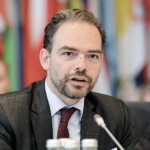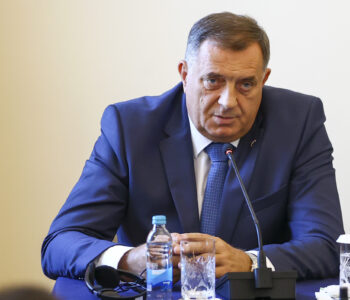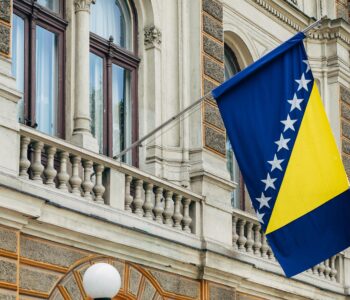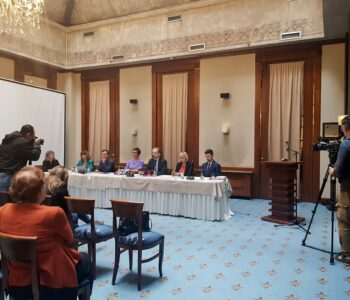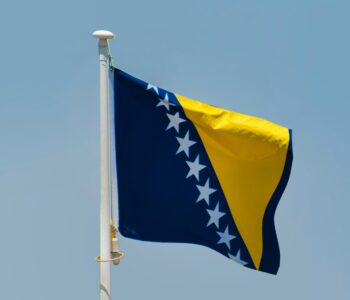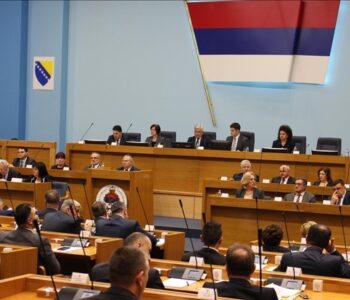These were the initial findings of a coalition of international journalists and media freedom organizations, including the International Press Institute (IPI), which visited BiH as part of a three-day mission coordinated by the Media Freedom Rapid response (MFRR) consortium on October 22-25.
The country had long experienced a stagnation in its progress for freedom or media and freedom of expression, amidst the slow fraying of the country’s constitutional framework and increased efforts by the government of one of the state’s two autonomous entities, Republika Srpska, to undermine Bosnian institutions and central governance.
However, since the country was granted candidate status for accession to the European Union in 2022, along with Ukraine and Moldova, the climate for press freedom has seen an overall decline in the past year, denting EU accession aspirations.
As the first EU progress report on Bosnia and Herzegovina since it was granted candidate status looms, Brussels is facing a complicated assessment regarding media freedom and freedom of expression due to the mixed picture emanating from within the country and its two autonomous entities.
While the situation in the Federation of Bosnia and Herzegovina is far from rosy, it is developments in the Serb-dominated entity and its capital Banka Luka which have caused the most significant backsliding and set warning bells ringing in Brussels and beyond. It is here the most serious verbal attacks and insults against journalists by public figures are occurring and where the legal framework for free media is becoming more treacherous.
The result is a national media landscape characterized by a widening divergence in press freedom at the entity-level and in which progressive legislation on media ownership transparency and state advertising all have little chance of being passed. After decades of transformation in the post-conflict era, progress has slowed to a halt and in some aspects has even gone into reverse, with worrying implications for democracy more widely.
Retrograde Republika
The most retrograde development is a trio of restrictive laws that have been passed or are currently under development in Republika Srpska, where entity president Milorad Dodik is steadily tightening the screws on independent media. This package of interlinked legislation is aimed at further shrinking the space for critical reporting and is contributing to a wider atmosphere of isolation amongst the small but vocal independent journalistic community.
The first law in Republika Srpska which has been passed recriminalized defamation, a second in the draft stage models Russia’s so-called foreign agent law, and a third currently under development behind the scenes would bar media from registering as NGOs, hitting the entity’s independent and investigative media. If all three are implemented, they could see journalists opened to punitive criminal lawsuits, labelled and stigmatized foreign agents, and forced to adapt their business models or re-register outside the Republika Srpska. Taken together, they could pose an existential threat to what remains of the small pool of independent media trying to hold power to account. Some non-profit media and civil society organizations have already begun to relocate outside the entity boundaries. If more follow suit, citizens could be left more in the dark than ever. While constitutional court challenges are likely, implementation of the decisions are by no means guaranteed.
It is no accident that the trio of laws are being brought forward in close proximity. The legal developments are set against a backdrop of wider democratic backsliding in the entity led by president Dodik, who is seeking to shore up his power after the recent election win met with widespread allegations of fraud. They also represent an extension of the already common verbal attacks and hostile rhetoric by public figures including Dodik, an Orbán-backed president who has labelled critical journalists as traitors and enemies of the state working against ethnic Serb interests.
When questioned about this rhetoric, government officials play down the matter. However, this harsh rhetoric used by Dodik and his allies to malign those who continue to publish critical reporting on unearth revelations is contributing, along with pending legal changes, in the creation of a more hostile climate. Self-censorship, already widespread amongst the wider journalistic community, would likely increase due to the chilling effect of the laws.
Recent pressures on journalists include the interrogation of Nikola Morača, who works for the newspaper EuroBlic and the portal SrpskaInfo. Several editors and journalists were also pressured by the police to reveal their sources. Cars belonging to Morača and the editor of the Buka news portal, Aleksandar Trifunović, were also vandalized. Before investigations were launched, Dodik publicly accused the journalists of orchestrating the attacks on their cars themselves.
Though direct acts of censorship are rare in the wider media landscape, reporting is highly politicized and coverage is skewed heavily in favour of the government. Although determined and high-quality independent journalism is being conducted in Republika Srpska, these private media are increasingly marginalized and face challenges threats to their work and funding. The psychological toll on individual journalists is clear to see.
Public media are also under pressure. For years, Dodik governing party the Alliance of Independent Social Democrats have wielded undue influence over the regional broadcaster, RTRS, through the appointment of politicized individuals to its oversight bodies. Under this management, RTRS has violated national law by refusing to hand over millions of euros in money from the licence fee collected in the entity to the national broadcaster BHRT.
Though the passing of the recent decriminalization of defamation sparked increased public interest in the work of journalists in RS, there is a sense that the public and civil society – which also works in a precarious legal situation – are intimidated into speaking up to defend what remains of free media.
Federation flaws
While developments in Republika Srpska are causing the most alarm, the situation in the other federal entity, the Bosniak and Croat-dominated Federation of Bosnia Herzegovina, is far from rosy.
In Sarajevo canton, one of the ten cantons which make up the Federation, the government introduced a new draft law ‘on Public Order and Peace’ that would empower the police to sanction anyone spreading “fake news” including online. This law expands the definition of a public place to the internet and would allow for fines of up to 7,500 euros for media found to have disseminated false news or “disparaged state authorities”. Though the draft appears to be on ice amidst outcry from journalists groups and international organizations, the public consultation and working group remain intact.
The BiH Journalists Association has also documented several worrying cases of verbal and online threats against journalists working in the entity in the last year. Political pressures on the public broadcaster remain an issue and the economic picture for independent journalism remains highly challenging, with over reliance on status subsidies often undermining editorial and institutional independence of media outlets. While serious challenges remain, the reality is that journalists working in the entity and the capital Sarajevo are subjected to fewer pressures than those working in Republika Srpska.
National level
Amidst a political climate riven with ethno-nationalist agendas, national-level policy making which would improve media freedom is proving increasingly difficult, while some recent legislative changes have been problematic.
The BiH Journalists Association has long called, for example, for a new law to bolster media ownership transparency, including of beneficial ownership, to help address the proliferation of obscurely owned blogs and websites which publish disinformation and defamatory content. They have also proposed a new law to regulate the transparency of public advertising campaigns in media, which have often been distorted into a form of clientelism. Both laws have been proposed for years and recommended by the EU, though no progress has been made due to a lack of national political consensus.
The safety of journalists also remains a key national issue, particularly the low rate of prosecutions of those who threaten the media. According to the BiH Journalists Association, only 25% of the cases involving journalists in the whole BH have been fully investigated. While the establishment of contact points within all police and prosecutors offices is a welcome step forward, thanks largely due to the efforts of the EU and OSCE, integrated institutional follow-up and prosecutions remain an issue across the country. The establishment of a national registry of attacks on journalists is another positive step, as are recent trainings of police officers about the rights of journalists. Their impact remains to be seen. While the number of violent incidents or threats against media remains relatively low compared to regional neighbours, the lack of justice undermines the sense of security for journalists.
Due again to a lack of cooperation between two entities, a proposed national working group for the safety of journalists – which would bring together national and entity-level police, prosecutors, journalists associations and others to review and track cases – has yet to see the light of day. While authorities in the Federation remain largely open to the idea, the potential cooperation runs contrary to the current political agenda in Republika Srpska.
Meanwhile, the national public broadcaster BHRT remains locked in a period of perennial crisis due to the blocked access to legally mandated licence fee funding, undermining its institutional stability and independence. Though the broadcaster narrowly avoided collapse in April 2022 thanks to a rescue package, its future is still uncertain. The withholding of licence fee money by Republika Srpska’s regional public broadcaster, RTRS, has deprived it of millions of euros in much needed funding. Though this clearly violates the 2005 public broadcasting law, the economic suffocation continues. The national broadcaster remains straddled by high levels of debt and the psychological pressure on its overworked staff is immense.
Elsewhere, the independence of the national Communication Regulatory Agency (CRA) also continues to be undermined by the politicized appointments of its director and the non-appointment of its management council. The selective approach of regulatory actions by the Agency have raised concerns, though these problematic decisions remain rare. Both institutions – the BHRT and CRA – are held back by competing nationalist agendas.
The legal framework for Freedom of Access to Information (FOI) at the national level was also weakened due to recent legislative changes in July 2023. Journalist groups complained the changes would significantly limit access to information of public interest due to the long list of exceptions public authorities could use to deny the release of data, adding onerous new hurdles for journalists and undermining transparency. Comments and recommendations from media and civil society were largely ignored, and the Ministry also did not follow recommendations by the European Commission to create a new independent body to oversee supervision of the implementation of the law.
Public interest journalism is being conducted by dogged journalists, and there is a healthy sense of solidarity between independent journalists in the country in the face of hardship. However, this unity is also too often divided down ethnic lines. Continued professional reporting in the television market by stations including N1 and Al Jazeera Balkans offers citizens high quality information. The online media market also includes a number of independent media houses. Investigative journalism, though underfunded, is being conducted by media like the Centre for Investigative Journalism and others. Yet overall, the media market remains fragmented, polarized and financially imperiled. The challenging economic outlook for journalism and weak labour protections for journalists pile further pressure on media workers.
Complex picture
The many political, economic and safety challenges facing independent journalism and media freedom in Bosnia and Herzegovina are set against a political landscape in which the forces of ethnonationalism are increasingly fraying the constitutional foundations of the state and acting as a maelstrom in which democratic values are being degraded. The gap between the health of press freedom in its two regional entities continues to widen. Worryingly, this overall backsliding on media freedom is occurring at the same time as the country strives for progress in its first report from the EU since it was granted official candidate status.
Continued international support for media freedom in BiH will be vital moving forward. Both the EU and the OSCE are actively engaged in media freedom in the country and appear to be working as best they can within their mandates to support independent journalism. Continued legislative consultation and financial support are crucial. However, given the growing severity of the issue in Republika Srpska, a stronger and more vocal opposition to these media laws is needed, particularly from the EU. Potential accession to the bloc is widely seen as the biggest tool for leveraging progress on media freedom and freedom of expression. The EU must use this leverage to more forcefully require changes, with more detailed recommendations. Real progress on media freedom and human rights in BiH cannot be sacrificed in the name of wider geopolitical considerations.
Achieving democratic improvement on media freedom in Bosnia and Herzegovina will be no easy task. The experience of previous years has already proven as much. In reality, progress moving forward will require concerted political will from leaders at both the entity and national level, as well as a willingness to put nationalist agendas aside to engage in cooperation on EU-guided reforms. While there are positive signs that this coordination on media freedom can be achieved in some formats, it so far remains far too limited in scope. As the EU progress report looms, the spotlight will likely put these many challenges into even sharper focus. All eyes will then be on how the government responds.
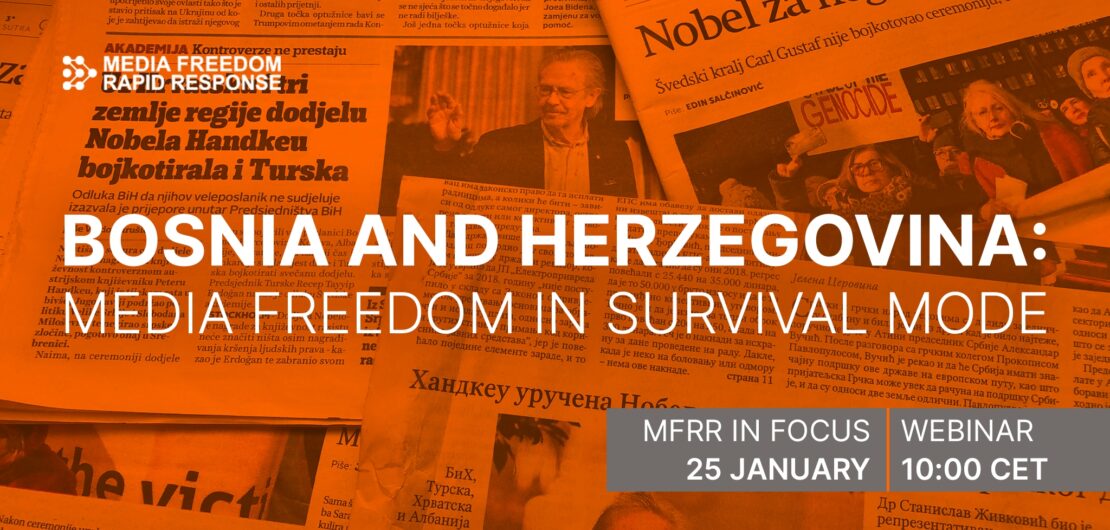 Event
Event

